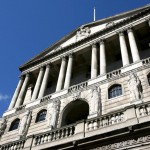Update: this posts relates to October 2012. For the latest interest prediction click here.
So when will interest rates go up?
Markets still think that the UK base rate is more likely to fall than rise! The market’s view is that interest rates will fall to 0.25% in January 2013 before rising back to 0.5% in the autumn of 2015. In fact the market is pricing in rates to remain at or below 0.5% until late 2017. To emphasise how dovish the market view has become, a year ago the market's view of when rates would rise centred around mid 2012 .
But why is a rate rise looking less likely?
- NO official support for a rate rise – last week the Bank of England’s Monetary Policy Committee (MPC), who are the guys who decide the UK base rate, once again voted to keep the base rate at 0.5%, for the 43rd month in a row.
- But a cut in the bank base rate is possible! - Such is the level of concern over the UK economy that even the head of the International Monetary Fund has called for the Bank of England to not only print more money but also to cut interest rates further. But while the MPC has discussed the possibility of cutting the base rate to just 0.25%, Mervyn King, the Governor of the Bank of England, seemed to dismiss the notion during his last quarterly inflation report. He claimed that a rate cut would be "more counter-productive than beneficial". However, markets are still pricing in a possible rate cut at the start of 2013.
- Inflation is proving sticky – the official measure of UK inflation dropped to 2.5% in August from 2.6% in July. On the face of it this is good news but followed an unexpected rise to 2.6% in July from 2.4% in June. High inflation could derail an economic recovery. To combat inflation interest rates are usually increased. Although inflation remains stubbornly high it is expected to fall further in 2012, and back under the Bank of England's 2% target in 2013.
- The UK recession has got worse – The UK was already officially in recession but the UK economy contracted by a further 0.4% in the 3 months to June. This took everyone by surprise and shows how desperate things have got. This will inevitably deter the MPC from raising rates. In July the Bank of England even took to printing £50bn more money (aka Quantitative Easing) to try and boost the economy. To find out how this will affect you read my article - Quantitative Easing explained and how it could affect you.
- Unemployment seems to be falling – The number of people out of work fell by 7,000 to 2.59 million in the three months to July, compared with the previous three month period. The UK unemployment sits at 8.1%. In theory a stable growing economy, will keep a lid on unemployment, and be more conducive to a rise in interest rates.
- Any signs of green shoots? – As the UK GDP figures disappointed there is little sign of any green shoots emerging especially as export figures remain dismal. To make matters worse recent economic indicators have shown that the all important services sector (which accounts for around 75% of our economic output) is slowing, while the construction and manufacturing sectors are contracting. The net result is of minimal overall economic growth.
- UK economic growth forecasts continue to be cut – be it the National Institute of Economic and Social research (which now believes the UK economy will shrink by 0.5% this year) or the Bank of England themselves (which has cut its growth forecast to close to zero from about 0.8% predicted in May). Raising rates would hammer consumers further and could derail any sniff of an economic recovery which would be bad news.
- Mervyn King doesn't want to raise rates – Mervyn King is the guy who heads up the group of people who set the bank base rate. Mervyn has previously said that there would be no rise in interest rates until there was clearer evidence that the economy was growing and that unemployment and the interest rates actually paid by consumers were falling. None of these will be happening any time soon.
